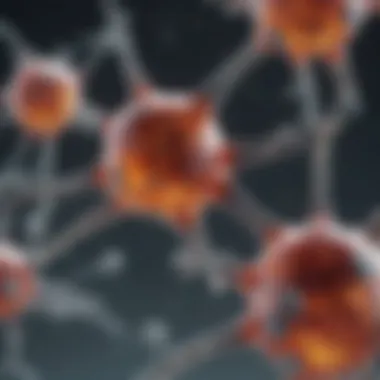Unraveling the Intricate Connection Between Alcohol and Neuropathy


Understanding the Link Between Alcohol Consumption and Neuropathy
Alcohol consumption can have a substantial impact on neuropathy, a condition that affects the peripheral nerves. Individuals who consume alcohol excessively often experience exacerbated neuropathic symptoms due to the harmful effects of alcohol on nerve function. The relationship between alcohol and neuropathy is complex and multifaceted, involving various mechanisms that contribute to the progression of this neurological disorder.
Exploring Mechanisms of Alcohol-Related Neuropathy
To understand the connection between alcohol consumption and neuropathy, it is crucial to delve into the mechanisms through which alcohol exerts its detrimental effects on the peripheral nerves. Chronic alcohol consumption can lead to nutritional deficiencies, particularly of essential B vitamins crucial for nerve health. Additionally, alcohol-induced oxidative stress and inflammation play a significant role in damaging nerve tissue, contributing to the development and worsening of neuropathic symptoms.
Implications for Individuals with Neuropathy
For individuals already living with neuropathy, alcohol consumption can pose significant challenges and risks. Excessive alcohol intake can exacerbate neuropathic pain, numbness, and tingling sensations, heightening the overall discomfort and impairing nerve function. Moreover, alcohol-induced neuropathy may complicate the management of existing neuropathic symptoms, necessitating adjustments in treatment approaches and lifestyle modifications to mitigate the detrimental effects of alcohol.
Importance of Awareness and Prevention
In light of the adverse impact of alcohol on neuropathy, raising awareness about this crucial connection and advocating for preventive measures is paramount. Educating individuals, especially those predisposed to neuropathic conditions, about the potential risks associated with excessive alcohol consumption can aid in preventing the onset or progression of alcohol-related neuropathy. By promoting healthier lifestyle choices and responsible drinking habits, the incidence of alcohol-induced neuropathy can be reduced, ultimately safeguarding nerve health and overall well-being.
Introduction
Neuropathy is a complex condition that significantly impacts individuals affected by it. Understanding the intricate connection between alcohol consumption and neuropathy is crucial for shedding light on the potential exacerbation of symptoms in affected individuals. This article aims to explore the multifaceted relationship between alcohol and neuropathy, delving into the mechanisms through which alcohol aggravates neuropathic symptoms. By addressing this topic comprehensively, readers can gain valuable insights into the potential consequences of alcohol consumption on nerve health and overall well-being.
Understanding Neuropathy
Definition of Neuropathy
In the realm of medical terminology, neuropathy refers to damage or dysfunction of one or more nerves, particularly those outside the brain and spinal cord. Within the context of this article, the definition of neuropathy serves as a foundational concept pivotal to comprehending the subsequent discussions. The key characteristic of neuropathy lies in its ability to manifest as varied symptoms depending on the nerves affected, making it a suitable focal point for addressing the intricacies of nerve-related conditions. Understanding the definition of neuropathy provides a baseline for exploring the nuanced interactions between alcohol consumption and nerve function.
Types of Neuropathy
When delving into neuropathy, it becomes apparent that various types exist, each with its unique characteristics and consequences. By discussing different types of neuropathy within this article, readers can grasp the diverse nature of nerve-related ailments and their distinct impacts on individuals. This exploration aims to elucidate the complexities surrounding neuropathy, offering insights into how specific types can lead to varying symptoms and challenges for those affected. Recognizing the breadth of neuropathy types enhances the understanding of how alcohol consumption may intersect with distinct nerve conditions.


Causes of Neuropathy
The origins of neuropathy are multifactorial, with causes ranging from diabetes and infections to traumatic injuries and exposure to toxins. Examining the causes of neuropathy within the context of this article provides crucial information on the underlying factors contributing to nerve damage and dysfunction. By highlighting these causes, readers can appreciate the diverse etiology of neuropathy and how addressing underlying factors is essential for effective management and prevention. Understanding the causes of neuropathy underscores the importance of considering individual circumstances in the broader discussion of alcohol's impact on nerve health.
Alcohol Consumption and Neuropathy
Impact of Alcohol on Nerve Function
The impact of alcohol on nerve function is a critical aspect that necessitates exploration within the context of neuropathy. Understanding how alcohol consumption directly influences nerve function can provide valuable insights into the mechanisms through which neuropathic symptoms may be exacerbated. By delving into this aspect, readers can gain a deeper understanding of the immediate consequences of alcohol intake on nerve health, underscoring the importance of moderation and awareness in alcohol consumption practices.
Role of Vitamin Deficiency in Neuropathy Development
Vitamins play a significant role in nerve health, with deficiencies in key nutrients like B vitamins contributing to neuropathy development. Examining the interplay between vitamin deficiency and neuropathy within this article offers crucial insights into the holistic management of nerve-related conditions. By elucidating the role of vitamin deficiency in neuropathy, readers can appreciate the nuanced connections between nutritional status and nerve function, emphasizing the need for balanced dietary practices to support nerve health.
Alcohol-induced Nerve Damage
Alcohol-induced nerve damage represents a serious consequence of excessive alcohol consumption, leading to detrimental effects on nerve structure and function. Exploring the specific mechanisms through which alcohol causes nerve damage provides essential knowledge for individuals seeking to understand the long-term implications of alcohol abuse on nerve health. By shedding light on alcohol-induced nerve damage, readers can grasp the severity of potential outcomes associated with prolonged alcohol misuse, highlighting the importance of proactive measures to mitigate these risks.
Clinical Studies and Findings
Research on Alcohol-Related Neuropathy
Research focusing on alcohol-related neuropathy offers valuable insights into the pathophysiology and clinical manifestations of this condition. Delving into the findings of such studies within the confines of this article provides a robust understanding of how alcohol can detrimentally affect nerve health. By synthesizing research on alcohol-related neuropathy, readers can glean evidence-based perspectives on the specific impacts of alcohol consumption on nerve function, guiding informed decision-making regarding alcohol use and its implications for nerve health.
Effects of Long-Term Alcohol Use on Nerve Health
Long-term alcohol use can have profound effects on nerve health, leading to chronic neuropathic symptoms and complications. Examining the long-term effects of alcohol use on nerve health within this article helps underscore the importance of considering sustained alcohol consumption patterns in relation to nerve damage. By elucidating the consequences of prolonged alcohol use on nerve health, readers can better appreciate the cumulative impact of alcohol on nerve function and overall well-being, prompting reflection on alcohol consumption habits and potential lifestyle modifications.
Mechanisms of Aggravation


In this detailed exploration of the impact of alcohol on neuropathy, the section on Mechanisms of Aggravation plays a crucial role in shedding light on how alcohol exacerbates neuropathic symptoms. By delving into specific elements such as the neurotoxic effects of alcohol and nutritional deficiencies, we uncover the intricate relationship between alcohol consumption and nerve damage. Understanding these mechanisms is essential for individuals looking to manage or prevent alcohol-related neuropathy effectively. Not only does this section highlight the detrimental effects of alcohol on nerve health, but it also underscores the importance of addressing these mechanisms to mitigate the progression of neuropathy.
Neurotoxic Effects of Alcohol
Alcoholic Neuropathy Pathophysiology
The discussion on Alcoholic Neuropathy Pathophysiology delves into the specific processes through which alcohol induces nerve damage. By highlighting the key characteristics of Alcoholic Neuropathy Pathophysiology, we can grasp why this aspect is pertinent to our exploration. Understanding the unique features of how alcohol pathologically affects nerves can provide insights into the underlying causes of neuropathy. This detailed analysis not only enhances our understanding of alcohol's neurotoxic effects but also serves as a foundational element in comprehending the overall impact of alcohol consumption on nerve health.
Oxidative Stress and Nerve Damage
When exploring Oxidative Stress and Nerve Damage, we uncover another critical aspect of alcohol's impact on neuropathy. By emphasizing the key characteristics of this process, we illuminate why Oxidative Stress and Nerve Damage merit discussion in our article. Describing the unique features of how oxidative stress contributes to nerve damage allows readers to grasp the complexities of alcohol-induced neuropathy fully. By elucidating the advantages and disadvantages of this mechanism, we provide a well-rounded view of the intricate relationship between alcohol consumption, oxidative stress, and nerve health.
Nutritional Deficiencies and Neuropathic Impact
When considering Nutritional Deficiencies and Neuropathic Impact, we delve into how vitamin B12, folate deficiency, and alcohol interference with nutrient absorption contribute to neuropathy. By highlighting the key characteristics of each aspect, we emphasize why these factors are essential in our discussion. Understanding the unique features of nutritional deficiencies in neuropathy development provides valuable insights into preventive measures and treatment strategies. By exploring the advantages and disadvantages of how alcohol interferes with nutrient absorption, we paint a comprehensive picture of the multifaceted impact of alcohol on nerve health.
Symptoms and Manifestations
In this article, Symptoms and Manifestations play a pivotal role in understanding the impact of alcohol on neuropathy. It is crucial to grasp the signs and manifestations indicating nerve damage caused by alcohol consumption. Delving into these symptoms allows individuals to recognize and address the effects of alcohol on peripheral nerves. By elucidating these manifestations, readers can gain insights into the progression of neuropathy and its implications for overall well-being.
Recognizing Neuropathic Symptoms
Numbness and Tingling in Extremities
Numbness and tingling in extremities serve as prominent indicators of neuropathy in individuals struggling with alcohol consumption. These sensations, characterized by a lack of feeling or a tingling sensation in the hands and feet, signify nerve damage due to excessive alcohol intake. The distinct nature of numbness and tingling serves as a warning sign, prompting individuals to seek medical intervention for potential neuropathic conditions. Understanding the nuances of these symptoms is essential for early detection and management of neuropathy, emphasizing the imperative need for individuals to address alcohol-related nerve damage promptly.
Muscle Weakness and Coordination Issues
Muscle weakness and coordination issues are prevalent consequences of alcohol-induced neuropathy, contributing significantly to the deterioration of motor functions. Individuals grappling with neuropathy may experience challenges in controlling their muscles and coordinating movements effectively. This aspect of neuropathic symptoms underscores the far-reaching impact of alcohol consumption on nerve health, highlighting the importance of recognizing these signs to initiate appropriate interventions and prevent further nerve damage.


Pain Sensations Due to Nerve Damage
Pain sensations resulting from nerve damage offer profound insights into the severity of neuropathy caused by alcohol consumption. Individuals with alcohol-induced neuropathy often experience sharp, burning, or throbbing pain in affected areas, signifying compromised nerve function. Understanding the nature of pain sensations due to nerve damage is crucial for individuals to comprehend the consequences of excessive alcohol consumption on peripheral nerves. Addressing these pain signals promptly is paramount in alleviating discomfort and preventing the progression of neuropathy, emphasizing the significance of early intervention and targeted management strategies.
Progression of Neuropathy
Severity of Symptoms Over Time
The progression of neuropathy manifests through the amplification of symptoms over time, underscoring the cumulative effects of alcohol consumption on nerve health. As neuropathic conditions worsen, individuals may experience heightened levels of numbness, tingling, muscle weakness, and debilitating pain. This escalation in symptom severity serves as a stark reminder of the long-term consequences of alcohol-induced nerve damage, urging individuals to prioritize holistic approaches to mitigate further deterioration.
Impact on Quality of Life
The impact of neuropathy on quality of life is profound, influencing daily activities, mobility, and overall well-being. Individuals grappling with alcohol-induced neuropathy often face challenges in carrying out routine tasks, engaging in physical activities, and maintaining social interactions due to persistent symptoms. The detriment to quality of life caused by neuropathy highlights the urgent need for interventions targeting nerve health and alcohol management. By addressing the impact of neuropathy on quality of life, individuals can make informed decisions to enhance their overall well-being and mitigate the adverse effects of alcohol consumption on nerve function.
Alcohol Moderation and Management
Alcohol Moderation and Management is a crucial aspect addressed in this article focusing on the relationship between alcohol consumption and neuropathy. Considering the detrimental impact alcohol has on peripheral nerves, understanding effective strategies for managing alcohol intake becomes imperative. By delving into Alcohol Moderation and Management, individuals can gain insights into practical steps to mitigate the risk of exacerbating neuropathic symptoms. Discussing the significance of moderation sets the tone for creating awareness around responsible alcohol consumption.
Strategies for Reducing Alcohol-Related Risk
Limiting Alcohol Intake
Limiting Alcohol Intake plays a pivotal role in reducing the risk of alcohol-related neuropathy. By controlling the amount of alcohol consumed, individuals can safeguard their nerve health and minimize the chances of developing neuropathic symptoms. Emphasizing moderation in alcohol consumption as a key strategy for mitigating neuropathy risks underscores the importance of mindful drinking habits. Limiting Alcohol Intake not only promotes overall well-being but also aids in preventing potential nerve damage caused by excessive alcohol consumption.
Seeking Professional Help for Alcohol Use Disorder
Seeking Professional Help for Alcohol Use Disorder is an essential component in managing alcohol-related neuropathy. Consulting healthcare professionals or addiction specialists can provide individuals with tailored support and guidance in addressing alcohol abuse issues. Recognizing the significance of seeking professional intervention underscores the seriousness of alcohol-induced neuropathic conditions and the need for specialized care. By advocating for professional help, individuals can access resources and treatment options to manage alcohol dependency and mitigate the risk of exacerbating neuropathic symptoms.
Nutritional Support and Supplementation
Importance of Balanced Diet for Nerve Health
The Importance of a Balanced Diet for Nerve Health is paramount in combating the adverse effects of alcohol on neuropathy. Ensuring adequate nutrition through a balanced diet rich in essential vitamins and minerals is instrumental in supporting nerve function and repair. Highlighting the role of nutrition in nerve health underscores the significance of maintaining a healthy dietary regimen to counteract the damaging effects of alcohol on peripheral nerves. By prioritizing a balanced diet, individuals can optimize their nerve health and reduce the impact of alcohol-induced neuropathic symptoms.
Supplements to Counteract Nutrient Deficiencies
Supplements to Counteract Nutrient Deficiencies offer a targeted approach to addressing potential gaps in essential nutrients caused by alcohol consumption. By supplementing with specific vitamins and minerals, individuals can replenish vital nutrients that may be depleted due to excessive alcohol intake. Emphasizing the role of supplements in supporting nerve health and countering nutrient deficiencies underscores the importance of a comprehensive approach to managing alcohol-induced neuropathy. Incorporating supplements as part of a well-rounded strategy can aid in mitigating the damaging effects of alcohol on peripheral nerves and promoting overall nerve well-being.















